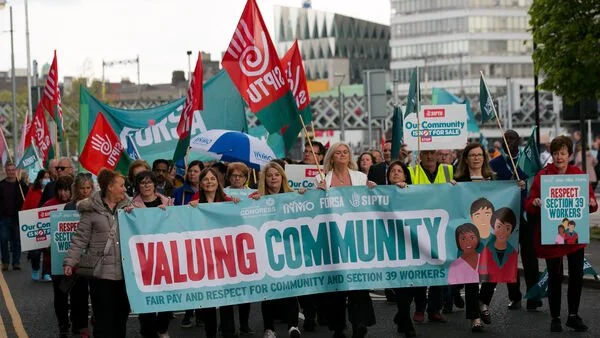As The Cost Of Living Crisis Deepens, Workers And Their Unions Are Fighting For Higher Wages
There are many things that can be done in the longer-term to combat cost-of-living inflation, things that Éirígí has long campaigned for, such as the creation of a new system of Universal Public Housing and by bringing the nation’s natural energy resources into public ownership.
In the meantime, however, workers and their trade unions are busy trying to protect their members interests. In the Public Sector in the Twenty-Six Counties, unions have triggered a review clause in the current wage agreement due to the rate of inflation and talks to secure a larger pay increase are under way at the Workplace Relations Commission (WRC).
Elsewhere in the public sector, members of the University and College Union in the Six Counties have engaged in a series of strike actions in a dispute over pay levels, a campaign that remains on-going.
Bausch and Lomb workers on the picket line in Waterford
In the private sector, members of the Services, Industrial, Professional and Technical Union (SIPTU) have commenced strike action at the Bausch and Lomb pharmaceutical plant in Waterford city in pursuit of a pay increase that protects their standard of living.
Meanwhile, Mandate, the largest trade union in the retail sector, is currently considering a 6% pay rise offer by Tesco, backdated to April 2021, with another 4% to follow in 2023.
The Financial Services Union (FSU) are also balloting their members in Allied Irish Bank on a 10% pay increase over three years and an increase in the minimum level of salary for new staff. A 7.5% increase in wage levels in the Bank of Ireland was recently approved by FSU members following negotiations at the WRC.
Postal workers, working together through their union, secured a pay increase of 5% over two years
In An Post, the Communications Workers Union members voted overwhelmingly to accept a pay offer worth just over 5% over two years. While a smaller increase than agreements achieved elsewhere, the deal also includes provisions for improved levels of pay for low paid staff and an improvement in pension arrangements.
Plumbers attached to the Connect Trade Union also voted to accept a 5.6% pay rise over two years in another WRC brokered agreement. Both Connect and the other union involved, Unite, have already submitted further pay claims given the current economic situation.
In the community sector, SIPTU, Forsa and the Irish Nurses and Midwives Organisation have joined forces to lodge a pay claim for workers across a range of organisations that provide a range of vital services, including family support centres, hospices and homecare services, amongst others.
Workers from SIPTU, Forsa and the Irish Nurses and Midwives Organisation on the streets of Dublin in May
In pursuit of this they organised a protest in Dublin on May 3rd last and industrial action in selected employments will follow if there is no move from the government on their pay levels, which have been largely unchanged since 2009.
Trade unions in Ireland are imperfect organisations in many ways, but they remain one of the only way for workers to have some influence on how their workplace operates.
They are also on of the main guarantors of a fairer economy and, everywhere that unions are strong, societal inequalities are reduced. While the struggle for a decent life for all on the Island has many fronts, union victories like the one outlined above, no matter how small, are a vital part of this process.




